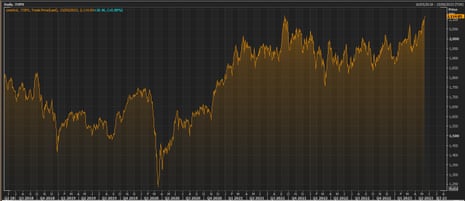EC lifts growth and inflation forecasts
Newsflash: Europe’s economy is expected to grow faster than previously expected over this year and next, but inflation will be higher than hoped too.
The European Commission’s latest economic forecasts, just released, show that the economy “continues to show resilience in a challenging global context”.
It says:
The EU economy is managing the adjustment to the shocks unleashed by the pandemic and Russia’s aggression of Ukraine remarkably well.
Last year, the EU successfully managed to largely wean itself off Russian gas.
With fears of a recession easing, growth so far this year has been stronger than expected, they say.
The EC now expects eurozone GDP to rise by 1.1% this year, up from 0.9% forecast in February, rising to 1.6% in 2024 (revised up from 1.5%).
The wider EU economy is forecast to expand by 1.0% in 2023, an improvement on the 0.8% predict in its winter interim forecast three months ago. The recovery is expected to accelerate in 2024 with growth of 1.7% (revised up from 1.6%).
Good news for European households and businesses.
The Commission says:
The European economy has managed to contain the adverse impact of Russia’s war of aggression against Ukraine, weathering the energy crisis thanks to a rapid diversification of supply and a sizeable fall in gas consumption.
Markedly lower energy prices are working their way through the economy, reducing firms’ production costs.
Consumers are also seeing their energy bills fall, although private consumption is set to remain subdued as wage growth lags inflation.
However, inflation has also been revised upwards compared to the winter, on the back of “persisting core price pressures”.
Inflation is now expected to average 5.8% across the eurozone in 2023, and drop to 2.8% in 2024 – still above the European Central Bank’s target of 2%.
Previously, inflation was forecast to average 5.6% this year, and 2.5% in 2024.
In 2022, eurozone inflation averaged 8.4%, so these new forecasts only offer modest relief for consumers.
Key events
European financial markets have mainly pushed higher this morning, helped by optimism over the economic outlook.
In London the FTSE 100 has hit its highest level in almost a week, up 37 points or 0.5% at 7792 points. Mining companies and banks are among the risers.
France’s CAC has also gained 0.5%, while Germany’s DAX is 0.2% higher.
Susannah Streeter, head of money and markets at Hargreaves Lansdown, says:
European indices have edged up on the open, with the FTSE 100 given a leg up after the dollar has strengthened, making the overseas earnings of multinational listings worth more.
The pound has fallen back to $1.24 against the dollar, although it has strengthened very slightly. Investors appear to have run back into the greenback’s safe-haven arms as sentiment has been knocked about global growth prospects.
This was not helped by a bleaker assessment of America’s prospects by consumers on Friday, as captured by the University of Michigan survey. Anxieties are colliding about the effect of high interest rates, combined with worries about the banking sector and now a potential US default as the debt ceiling deadline looms.
The whipsaw in sentiment may continue this week with the US retail sales snapshot due out tomorrow. Although a recovery may help ease some concerns about falling optimism, it could also increase expectations that the Fed might be forced to hike interest rates further.
FT: UK holiday resort Center Parcs up for sale

The Financial Times is reporting that UK holiday resort Center Parcs is up for sale.
The planned sale, by Canadian private equity group Brookfield, will test investors’ willingness to bet on the UK economy as it faces high inflation and rising interest rates, the FT says.
Brookfield are apparently seeking between £4bn and £5bn for Center Parcs, the family-focused holiday company which operates six villages in England and one in Ireland.
The FT says:
The decision to go ahead with the sale marks a bold move for Brookfield as the UK faces falling property values and higher interest rates. But a sale could potentially net a windfall for Brookfield, which acquired the resort group from Blackstone for about £2.4bn in 2015.
Brookfield has appointed investment bankers who have been sounding out potential buyers in the past week, the people said.
Brookfield and Center Parcs declined to comment.
Center Parcs runs site at Sherwood Forest in Nottinghamshire, Longleat Forest in Wiltshire, Elveden Forest in Suffolk, Woburn Forest in Bedfordshire and Whinfell Forest in Cumbria (where the red squirrels were on fine form at Easter, we can confirm), and Longford Forest in County Longford, Ireland.
Japanese stocks hit 18-month high
Back in the financial markets, Japan’s share index has hit its highest level in 18 months.
Investors have been seeking stocks with robust earnings, while the yen’s weakness is also boosted sentiment (as it makes exporters more competitive).

Victoria Scholar, head of investment at interactive investor, explains:
“The Nikkei has rallied to a fresh 18-month high, pushing above 29,600 with financials leading the gains.
Better-than-expected producer price data which rose the least in 20 months, as well as stronger Japanese earnings and improved share buybacks have supported its equity index. Plus, export stocks have benefitted from the yen’s weakness which hit a near record low against the Swiss franc over the weekend.
The Nikkei 225 is up 15% year-to-date, with gains accelerating lately, having rallied almost 4% over the past month.”
ले गइ गील…गुडिया जापान की…पागल मुजे कर दीया..
जापान..लव इन टोकयो..#topix monthly chart..Topix is just traded near 33 year high. Oracle of Omaha is bullish on Japan since few years is a widely known fact. Look a long term bull market. pic.twitter.com/jYOAnTQAMM— Biren Vakil Paradigm (@Birenvakil) May 15, 2023
EC: Formidable efforts needed for Ukraine reconstruction
For the first time, the EC’s economic forecasts include a prediction for Ukraine (as it has been given candidate status for EU membership).
The report says that before the Russian invasion last year, Ukraine’s economic development had been held back by “a somewhat uneven implementation of structural reforms”.
It also suffered from regular interference from vested interests, plus “a high degree of corruption, chronically low levels of investment, and territorial disputes also linked to the 2014 illegal annexation of Crimea by Russia”.
The EC says Ukraine has demonstrated remarkable resilience during the war, and its efforts towards joining the EU, having been granted candidate country status on 23 June 2022, should improve its prospects.
But, GDP is estimated to have crumpled by over 29% last year in the war. Little recovery is expected this year, with growth of just 0.6% seen in 2023, rising to 4% in 2024.
The report adds that an “ambitious reform programme” is needed to align Ukraine with its path into the European Union, saying:
The outlook is, however, subject to extraordinary uncertainty and critically depends on the evolution of the war.
Formidable efforts will be needed to attract investment and launch a full-scale reconstruction, the cost of which has been recently estimated at $411bn by the World Bank’s Rapid Damage and Needs Assessement II.
Full story: Vice files for bankruptcy protection amid cut-price sale to consortium

Mark Sweney
Vice, the once high-flying media startup which reached a peak valuation of nearly $6bn (£5bn) has filed for bankruptcy protection in the US as the digital publisher engineers a cut-price sale to a group of lenders, my colleague Mark Sweney reports.
The company, whose assets include Vice News, Motherboard, Refinery29 and Vice TV, has agreed a sale to a consortium that includes Fortress Investment Group, Soros Fund Management and Monroe Capital for $225m in the form of a credit bid for its assets as well as assuming Vice’s “significant liabilities”.
Creditors can swap their secured debt, rather than pay cash, for the company’s assets. Vice said it “expects to emerge as a financially healthy and stronger company” when the process concludes.
More here:
EC: Core inflation has been firming….
The EC is also concerned that inflation is falling more slowly than hoped, which could trigger more interest rate increases.
Today’s Spring Forecasts warn that the resilience of the EU economy has also delayed the slowdown of inflation.
Although consumer prices inflation is expected to drop this year – to 5.8% from 8.4% – that’s higher than forecast in February.
The EC is concerned that core inflation (stripping out food and energy costs) has been ‘firming’, saying:
Falling energy commodity prices are driving a sharp fall in energy consumption bills and the overall rate of price growth from its October peak, but core inflation has been firming. As a result, markets have raised expectations about future policy rate hikes.
The small contraction of core inflation in April suggests that it has also peaked, but the convergence towards target is now expected to take longer. Greater persistence of core inflation would call on monetary authorities to act even more forcefully to stem inflationary pressures.
“We can and should be proud of the fact that the European economy is showing such remarkable resilience,” commissioner Paolo Gentolini concludes.
He says that succesful management of the energy crisis, coordination of fiscal policies, and Europe’s Recovery and Resilience Facility created to drive the recovery from Covid-19 all helped the economy do better.
But there is “no reason for complacency.”, with inflation still high, Gentolini tells reporters in Brussels, adding:
This means we must ensure that fiscal policy is consistent with our policy priorities. In the same vein, it is important to maintain the momentum in the implementation of the Recovery and Resilience Plans.
But…. risks are tilted to the downside
However….the balance of risks facing Europe’s economy has “tilted back to the downside” since February, the EC fears, despite lifting its forecasts today.
Commissioner Gentolini says there are several reasons why the downside risks have increased, warning:
Core price pressures could turn out more persistent if wages accelerate more than currently projected, and without adjustment in profit margins.
Higher-than-expected core inflation would lead to a stronger reaction of monetary policy, with broad macroeconomic ramifications for investment and consumption.
Risks related to the EU’s external environment remain elevated. New uncertainties following the banking sector turbulence, or related to wider geopolitical tensions, compound the long-standing concerns about the impact of rising interest rates on vulnerable emerging markets.
And of course, Russia’s war of aggression against Ukraine continues to cast a long shadow of uncertainty over the economy.
On the positive side, more benign developments in energy prices or a faster transmission of wholesale energy price declines to consumers would lead to a faster decline in headline inflation, with positive spillovers on domestic demand.
In the first quarter of this year, GDP grew by 0.3% in the EU, which is slightly above the projection in February’s Winter Forecast, commissioner Paolo Gentolini points out, adding:
Information available at this stage for only a few countries, points to subdued consumption growth and robust investment growth, despite tighter financing conditions.
Net exports contributed to growth thanks to the improvement in the terms of trade and a strong tourism performance.
For the second quarter, survey indicators suggest continued expansion, with services clearly outperforming the manufacturing sector. In particular, the energy-intensive manufacturing sectors are still reeling from the energy shock of last year. Consumer confidence has continued its recovery from last autumn’s historic low.
The EC has mixed news for workers today, in its new economic forecasts.
On the upside, the labour market remains strong. The eurozone jobless rate is expected to remain at 6.8% this year, as in 2022, and drop to 6.7% next year.
But on the downside, wage growth is set to fall short of inflation again this year – it may take until 2024 for a “significant recovery of real wages”.
Commissioner Paolo Gentolini tells reporters in Brussels:
The EU economy continues to be underpinned by the strongest labour market in decades. Unemployment rates keep hitting record lows. And the participation and employment rates stayed at record high.
Despite the expected slowdown in economic activity, the labour market is set to remain strong.
The European economy is in better shape than we projected last autumn.
It is holding up remarkably well in the face of Russia’s aggression against Ukraine, leading to an upgrade in today’s growth forecast for 2023.
Read the Spring #ECForecast ↓
— European Commission (@EU_Commission) May 15, 2023










